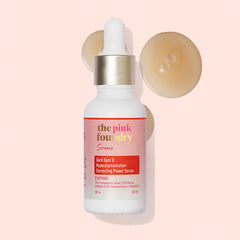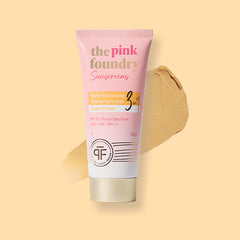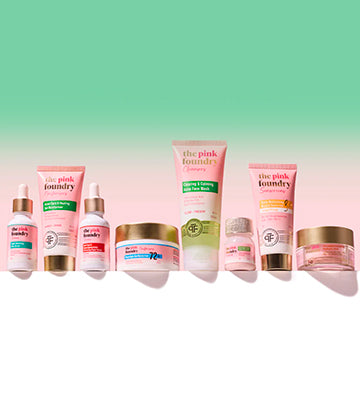Panthenol in Skincare

Introduction
Panthenol, also referred to as vitamin B5, is one of the components that have gained popularity in recent years in the formulation of skin care products. It is also a humectant that absorbs moisture from the environment and is therefore useful in preventing transepidermal water loss from the skin. Further, it acts as an emollient, which helps in hydrating the skin and in guarding it from environmental and internal stresses.
Read more about other emollients used in skincare:
Stearic acid
What is panthenol?
Pantothenic acid is commonly known as vitamin B5, and panthenol is a substance derived from it. At moderate temperature, it is a viscous liquid or colourless oil. Being an analogue of vitamin B5, it has a hydroxyl group in its structure and is therefore classified as an alcohol. Experts also call it pro-vitamin B5, because this vitamin does not apply topically and is converted to pantothenic acid in the body. Panthenol is also frequently found in topical cosmetic preparations as a moisturiser. As previously mentioned, panthenol has applications as a film-forming and skin-soothing agent, as well as an anti-irritant agent.
What does panthenol do in skincare products?
Panthenol is often used as an emollient to improve the spreadability of products. In addition, it also works as a moisturiser to prevent skin from becoming dry or uncomfortable. It has moistening properties and improves the barrier and its repair. This capability allows the formulations to retain sufficient amounts of moisture within the cells. In addition, it assists in the strengthening of skin barrier function, thereby preventing the skin from being damaged or losing water content due to the environment. In individuals with sensitive skin, panthenol works extremely well as an anti-inflammatory agent. For conditions like eczema, psoriasis, sunburn, etc., it has anti-inflammatory properties that help in reducing redness and swelling.
Is panthenol different from d-panthenol?
Panthenol and D-panthenol refer to the same substance but in different forms. D-Panthenol is a site-specific stable form of panthenol (pantothenic acid and vitamin B5) present in several beauty and skin care products due to its moisturising and anti-inflammatory properties. It is to be noted that D-panthenol is an oily substance; however, the term panthenol is to some extent fraudulent as it refers to both D-panthenol and its mixture of racemic DL-pantheon (white powder).
Also read: What is d-panthenol in skincare?
Panthenol benefits in skincare
Panthenol has a number of advantages for the skin and is a constituent that is found in most products. A few of them include:
- Moisture: Panthenol enhances a moist feeling on the skin by increasing the moisture content of the skin. This is a strong moisturiser as it holds water on the skin.
- Soothing properties: Panthenol has some soothing properties in the skin, and it has the capacity to calm irritated skin. It strengthens the barrier of the reactive skin and calms the irritation and other discomfort present on the skin.
- Reduction of inflammation: Panthenol also helps prevent skin burning or inflammatory reactions during too much sun exposure. This allows the use of this element in sun protection as well as preventing inflammation after sun exposure.
- Repair of wounds: Panthenol has the ability to accelerate the healing of wounds and other dermatological injuries by facilitating the reconstruction of tissues and skin.
- Fighting ageing: Panthenol is also useful against fine lines as well as wrinkles by promoting collagen and elastin production that brings about youthful skin.
- Skin elasticity: Panthenol aids in enhancing skin elasticity, which enhances the suppleness and tones the skin.
Precautions while using panthenol
There are several precautions that should be taken into consideration when you are using products containing Panthenol. Some of them are mentioned below:
- Allergic reactions: Panthenol may provoke an allergic response and cause skin irritation in a few individuals. Patch test is very essential for those who are the first time users of the products containing panthenol. Such products should be examined as well for any adverse effects such as redness, itching or swelling.
- Product formulation: In addition to being marketed as a stand-alone ingredient, many cosmetic and skin care products tend to contain panthenol. Also, be very careful with the entire formulation, especially if you have an allergic reaction.
- Eye contact: Panthenol-containing agents should not be applied in the vicinity of the eyes. If contact is made, it should be rinsed with water for any area affected.
- Pre-existing skin conditions: Such individuals suffering from dermatitis, eczema, or psoriasis should refrain from using these products until they have pursued an opinion on the uses and safety of panthenol from a dermatological perspective.
- Storage: Panthenol-containing formulations should be stored as per the directions on the packaging, preferably in a dry and cool place free from direct sunlight to avoid losing their effects and stability.
Conclusion
Panthenol is an important ingredient that could help everyone who suffers from dry or irritated skin. However, it is specifically effective for those wanting to enhance skin moisture levels and soothe irritation while achieving supple and softer skin. It is likewise a wonderful thing to add in after the skin treatments or procedures. As always, it is better to contact a skincare expert or a dermatologist to find out whether panthenol is appropriate when it comes to your skin type in particular.
Related Blogs

Skin Minimalism: The Simple Skincare Routine You Need
TABLE OF CONTENTS What is Skin Minimalism? Benefits of Skin Minimalism Best Minimal Skincare Routine Skin...
Continue Reading
Ethyl Ascorbic Acid vs. L Ascorbic Acid: Which Vitamin C Form is Best for Your Skin?
TABLE OF CONTENTS Ethyl Ascorbic Acid vs L Ascorbic Acid: Key Differences Benefits of Each Form of Ascorbic Acid ...
Continue Reading
Best Anti-Aging Ingredients You Should Include in Your Skincare Routine
TABLE OF CONTENTS Best Anti-Ageing Ingredients for Skin How These Ingredients Work How to Use Anti-Ageing Ingredi...
Continue Reading
How Often to Use Salicylic Acid: Finding the Right Frequency for Your Skin
TABLE OF CONTENTS How Often Should I Use Salicylic Acid Serum? How Often to Use Salicylic Acid for Specific Skin Types ...
Continue Reading















